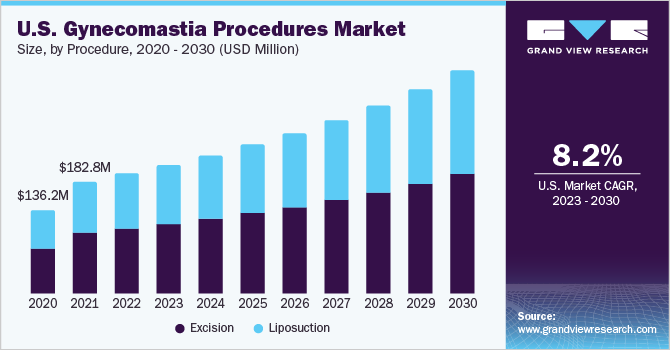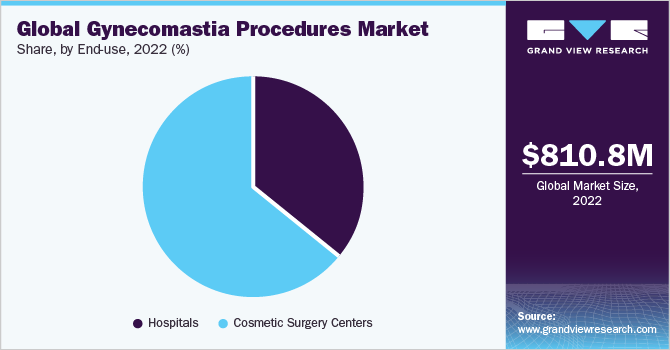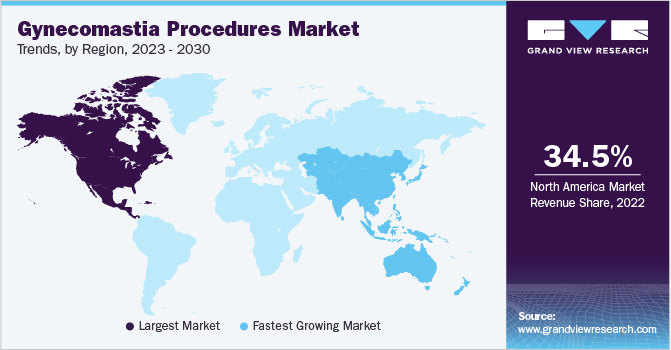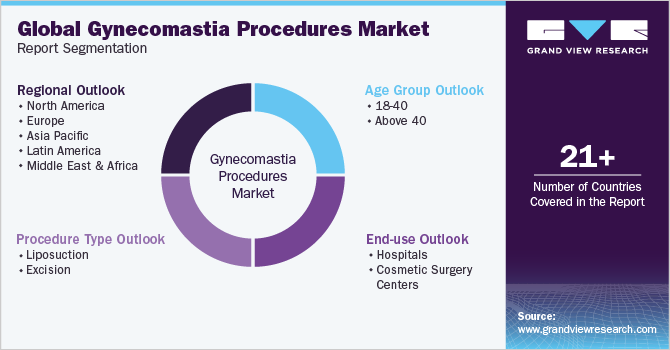
Gynecomastia Procedures Market Size, Share & Trends Analysis Report By Age Group (18-40, Above 40), By Procedure Type (Liposuction, Excision), By End-use, By Region, And Segment Forecasts, 2023 - 2030
- Report ID: GVR-4-68040-099-4
- Number of Pages: 180
- Format: Electronic (PDF)
- Historical Range: 2018 - 2022
- Industry:Healthcare
Report Overview
The globalgynecomastia procedures market sizewas estimated atUSD 810.8 million in 2022and is projected to grow at a compound annual growth rate (CAGR) of 8.8% from 2023 to 2030. For hormonal imbalances and obesity, the use of medications such as anabolic steroids and antidepressants is the major factor that drives market growth. Moreover, changing lifestyles, such as sedentary habits and poor dietary intake, further contribute to the development of gynecomastia prevalence. In addition, advancement in treatment options, such as the development of minimally invasive procedures such as liposuction and glandular tissue excision, has further contributed to the growth of the market. The demand for a liposuction procedure is high as it offers a success rate of 85% - 95%, making it a reliable treatment option.

The cases of gynecomastia have surged in recent years. Thus, it is widely recognized as a relatively common condition. Studies have reported that gynecomastia affects approximately 50-60% of adolescent boys during puberty to some degree, although most cases are mild and resolve on their own without any treatment. Moreover, the prevalence of gynecomastia varies depending on the population studied. Estimates suggest that approximately 65% of adult men may experience gynecomastia at some point in their lives. The prevalence tends to increase with age, with higher rates observed in elderly males. As per an article published in April 2022, in India, approximately 29,532 gynecomastia procedures are performed annually, indicating a large number of patients having gynecomastia.
Moreover, the growing association of self-esteem with physical appearance will drive market growth. According to an article published by the Journal of Education and Health Promotion in August 2022, self-esteem was negatively associated with unhealthy weight in young adults. Furthermore, the increasing prevalence of the geriatric population in developed countries positively aids market growth. In addition, the American Academy of Dermatology Association stated that no severe complications were noticed in the elderly undergoing cosmetic surgeries. Moreover, body-contouring procedures such as gynecomastia had improved procedural outcomes than the younger age group owing to a better lifestyle. However, factors such as poor reimbursement policies and low awareness about the procedure impede market growth.
The COVID-19 pandemic had several effects on the market for gynecomastia. Non-essential surgeries, including those for gynecomastia, were often postponed or canceled during the peak of the pandemic, leading to a temporary decline in surgical procedures. Patient visits and diagnoses related to gynecomastia drastically decreased during the peak of COVID-19 as individuals postponed or canceled routine check-ups, thereby negatively impacting the market growth.
Age Group Insights
Based on age group, the market has been segmented into 18-40 years age and above 40 years age. The above 40 years segment dominates the market with the highest share of 61.0% in 2022 and is projected to have the fastest growth over the forecast period. The dominance of the above-40 age group in the market for gynecomastiacan be attributed to factors such as hormonal changes, cumulative effects of risk factors over time, medication use, health conditions prevalent in elder individuals, and greater financial capability. With aging, hormonal changes naturally occur in men, leading to a higher risk of developing gynecomastia. The decline in testosterone levels and an increase in body fat contribute to the development of breast tissue, making elderly individuals more susceptible to gynecomastia.
On the other hand, the 18-40 age segment is also expected to showcase lucrative growth over the forecast period. Gynecomastia commonly occurs during puberty when hormonal changes are at their peak.This age group represents the period when puberty typically occurs, resulting in a higher incidence of gynecomastia cases. Moreover, the 18-40 age group may be more aware of gynecomastia as societal awareness grows, thus, individuals in this age range may be more likely to seek medical intervention for gynecomastia concerns, leading to a higher representation in the market.
Procedure Type Insights
Based on procedure type, the market has been segmented into liposuction and excision. The excision procedure segment dominates the market with a revenue share of 54.2% in 2022. In cases where gynecomastia involves the enlargement of glandular tissue rather than just excess fat, surgical excision is more effective than a liposuction procedure. Moreover , the advancements in surgical techniques for glandular tissue excision have contributed to the increasing popularity of excision surgery. Surgeons now have access to refined and precise methods that allow for more effective removal of glandular tissue with minimal scarring. These advancements have increased the confidence of patients and surgeons in excision surgery as a viable treatment option.
On the other hand, liposuction is expected to show the fastest growth over the forecast period with a CAGR of 9.0% due to it being a less invasive procedure than excision surgery. Liposuction involves making small incisions through which cannulas are inserted to suction out excess fat. The minimally invasive nature of liposuction appeals to patients as it often results in smaller scars, quicker recovery times, and reduced post-operative discomfort compared to excision surgery.
End-use Insights
Based on end-user, the market has been segmented into hospitals and cosmetic surgery centers. The cosmetic surgery centers segment held the largest market share of over 63.8% in 2022, owing to their specialization in various aesthetic procedures, including those related to body contouring and breast surgery. Surgeons in these centers often have extensive experience and expertise in performing gynecomastia procedures, ensuring optimal outcomes and patient satisfaction. Moreover, cosmetic surgery centers are more focused on aesthetic outcomes as they understand the impact of gynecomastia on a patient's self-confidence and body image and strive to provide more natural and balanced results, thereby contributing to the rising demand for cosmetic surgery centers.
Furthermore, various long-term patient trial data confirm the safety of patients in these centers. As per the American Society of Plastic Surgeons, a complication rate of under 1% was identified in cosmetic procedures performed outside the hospital. Moreover, growing establishments and the introduction of technologically advanced clinics will provide lucrative opportunities for the Brachioplasty market. For instance, as per the National Institute of Health, 82% of cosmetic procedures performed in the U.S. in 2020 were handled in outpatient surgical centers.

On the other hand, the hospital segment is also anticipated to have lucrative growth over the forecast period. Hospitals provide comprehensive healthcare facilities, including specialized departments and equipment for the treatment of various medical conditions. With the growing recognition of gynecomastia as a medical concern, hospitals have expanded their services to include gynecomastia treatment options, ensuring that patients can access specialized care in a hospital setting.
Regional Insights
North America held the largest market share of over 34.5% in 2022. The factors that drive the regional growthare advanced healthcare infrastructure, stringent regulatory environment, emphasis on patient safety and quality of care,and the presence of key players. Moreover, the greater affordability of healthcare services and relatively higher disposable incomes enable individuals to pursue gynecomastia treatments more readily. The North America market is highly competitive, with numerous specialized clinics, hospitals, and healthcare providers offering a wide range of treatment options. This competition drives innovation and ensures a high standard of care, further solidifying the region's dominance in the market.

Asia Pacific is expected to register the fastest growth rate during the forecast period. Rising awareness about gynecomastia and its treatment options is increasing in the Asia Pacific region, therefore the stigma associated with gynecomastia is gradually diminishing, leading to greater acceptance and a higher demand for treatments. Moreover, the Asia Pacific region has witnessed significant economic growth in recent years, resulting in an increase in disposable income among the population, further boosting the market growth in the region.
Key Companies & Market Share Insights
The market players are involved in product launches, expansions, collaborations, and acquisitions to sustain the competition. For instance, in March 2023, Cadila Pharma announced an expansion of their existing facility with a huge investment of Rs 1,000 crore in Gujarat. Some of the key players in the global gynecomastia procedures market include:
Cadila Pharmaceuticals Ltd
Sun Pharmaceuticals Industries Ltd
Zydus Cadila Healthcare Ltd
Biochem Pharmaceutical Industries Ltd
Dr. Reddy's Laboratories Ltd
Micro Nova Pharmaceuticals Ltd
Kee Pharma Ltd
Gynecomastia Procedures MarketReport Scope
Report Attribute |
Details |
Market size value in 2023 |
USD 875.3 million |
Revenue forecast in 2030 |
USD 1.58 billion |
Growth rate |
CAGR of 8.8% from 2023 to 2030 |
Base year for estimation |
2022 |
Historical data |
2018 - 2022 |
Forecast period |
2023 - 2030 |
Quantitative units |
Revenue in USD million/billion and CAGR from 2023 to 2030 |
Report coverage |
Revenue forecast, company ranking, competitive landscape, growth factors, and trends |
Segments covered |
Age group, procedure type, end-use, region |
Regional scope |
北美;欧洲;亚太地区;拉丁美洲; MEA |
Country scope |
U.S.; Canada; Germany; UK; France; Italy; Spain; Norway; Denmark; Sweden; China; Japan; India; Australia; Thailand; South Korea; Brazil; Mexico; Argentina; South Africa; Saudi Arabia; UAE; Kuwait |
Key companies profiled |
Cadila Pharmaceuticals Ltd; Sun Pharmaceuticals Industries Ltd; Zydus Cadila Healthcare Ltd; Biochem Pharmaceutical Industries Ltd; Dr. Reddy's Laboratories Ltd; Micro Nova Pharmaceuticals Ltd; Kee Pharma Ltd |
Customization scope |
Free report customization (equivalent up to 8 analyst's working days) with purchase. Addition or alteration to country, regional & segment scope. |
Pricing and purchase options |
Avail customized purchase options to meet your exact research needs.Explore purchase options |
Global Gynecomastia Procedures Market Report Segmentation
This report forecasts revenue growth at regional and country levels and provides an analysis of the latest industry trends in each of the sub-segments from 2018 to 2030. For this study, Grand View Research has segmented the global gynecomastia Procedures Market report based on age group, procedure type, end-use, and region:

Age Group Outlook (Revenue, USD Million, 2018 - 2030)
18-40
Above 40
Procedure Type Outlook (Revenue, USD Million, 2018 - 2030)
Liposuction
Excision
End-use Outlook (Revenue, USD Million, 2018 - 2030)
Hospitals
Cosmetic Surgery Centers
区域Outlook (Revenue, USD Million, 2018 - 2030)
North America
U.S.
Canada
Europe
UK
Germany
France
Italy
Spain
Denmark
Sweden
Norway
Asia Pacific
Japan
China
India
South Korea
Australia
Thailand
拉丁美洲
Brazil
Mexico
Argentina
Middle East & Africa
South Africa
Saudi Arabia
UAE
Kuwait
Frequently Asked Questions About This Report
b.The global gynecomastia procedures market size was estimated at USD 810.8 million in 2022 and is expected to reach USD 875.3 million in 2023.
b.The global gynecomastia procedures market is expected to grow at a compound annual growth rate of 8.8% from 2023 to 2030, reaching USD 1.58 billion by 2030.
b.North America held the largest market share of over 34.5% in 2022. The factors that drive the region growth are advanced healthcare infrastructure, stringent regulatory environment, emphasis on patient safety and quality of care and the presence of key market players.
b.Some key players operating in the gynecomastia procedures market include Cadila Pharmaceuticals Ltd, Sun Pharmaceuticals Industries Ltd, Zydus Cadila Healthcare Ltd, Biochem Pharmaceutical Industries Ltd, Dr. Reddy's Laboratories Ltd, Micro Nova Pharmaceuticals Ltd, Kee Pharma Ltd
b.. Hormonal imbalances and obesity use of medications like anabolic steroids and antidepressants are the major factor that drives the market growth. Moreover, changing lifestyles, such as sedentary habits and poor diets, further contribute to the development of gynecomastia prevalence





